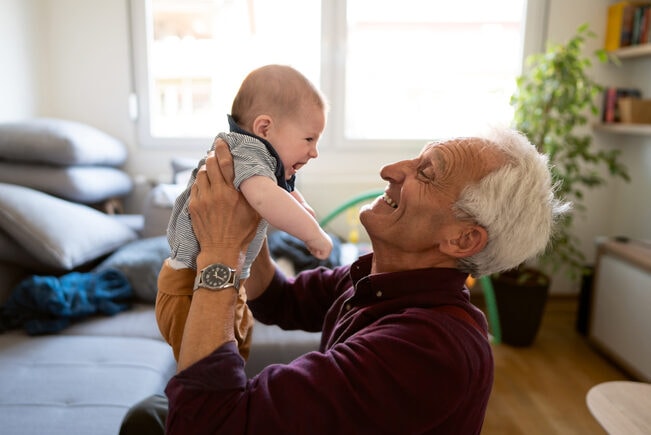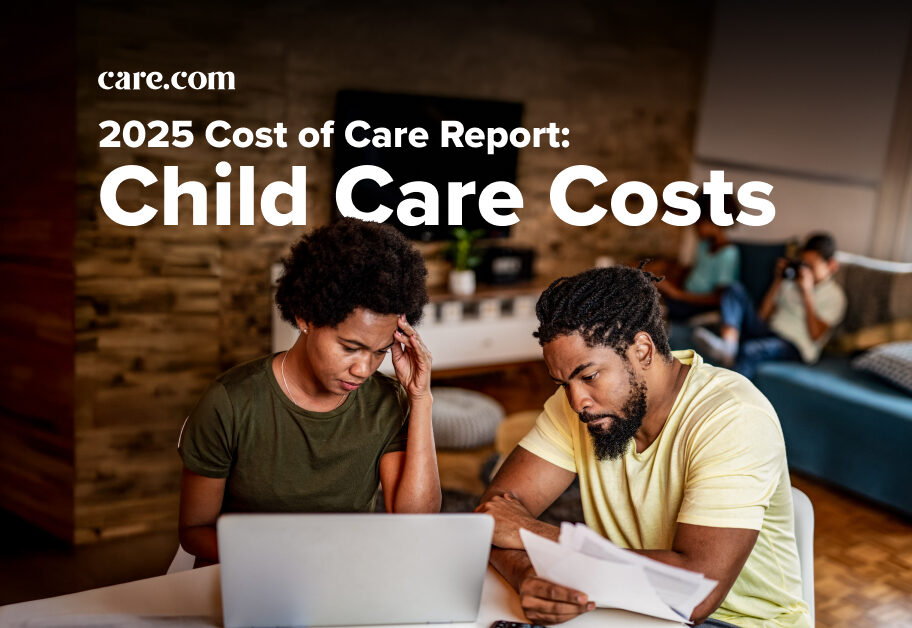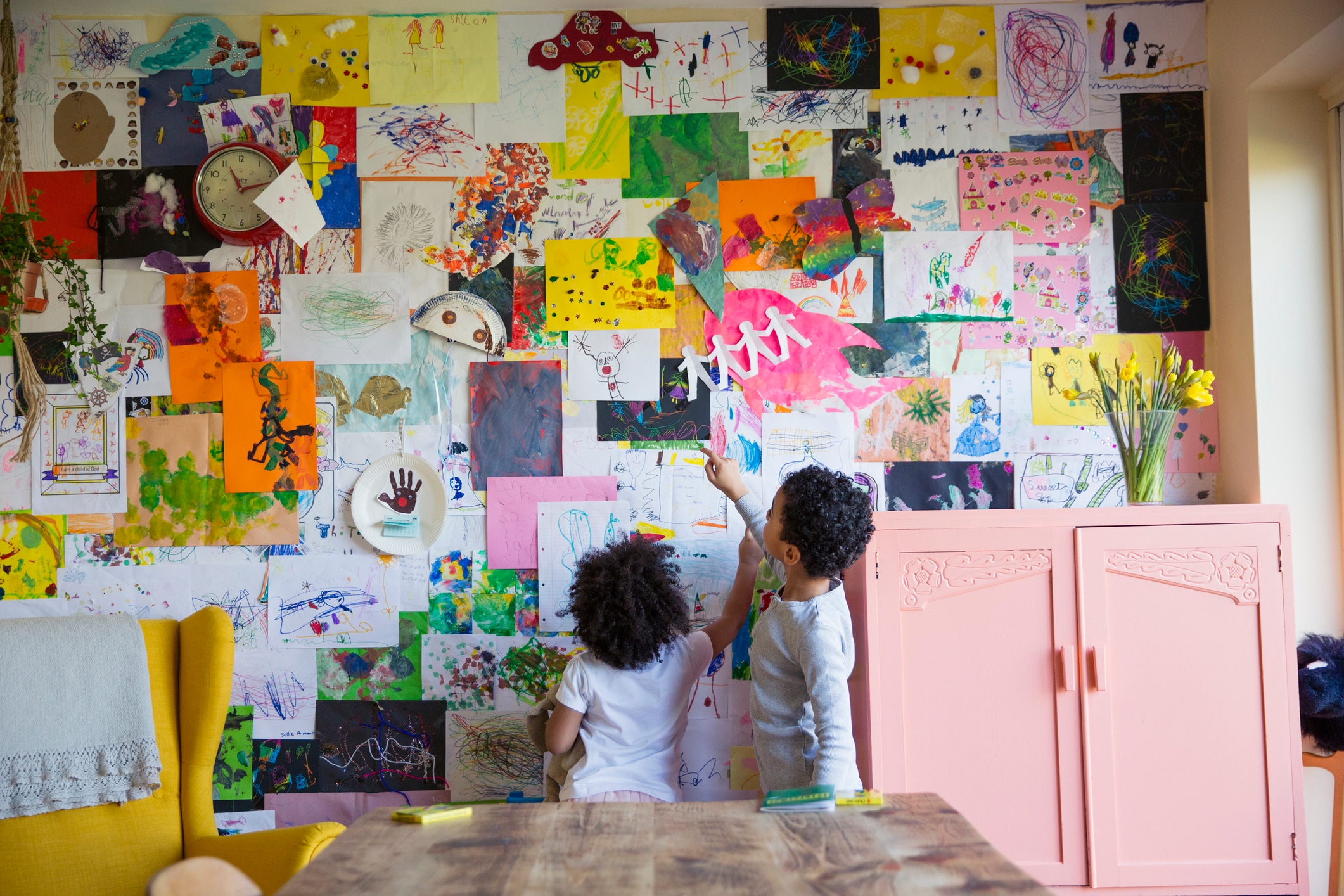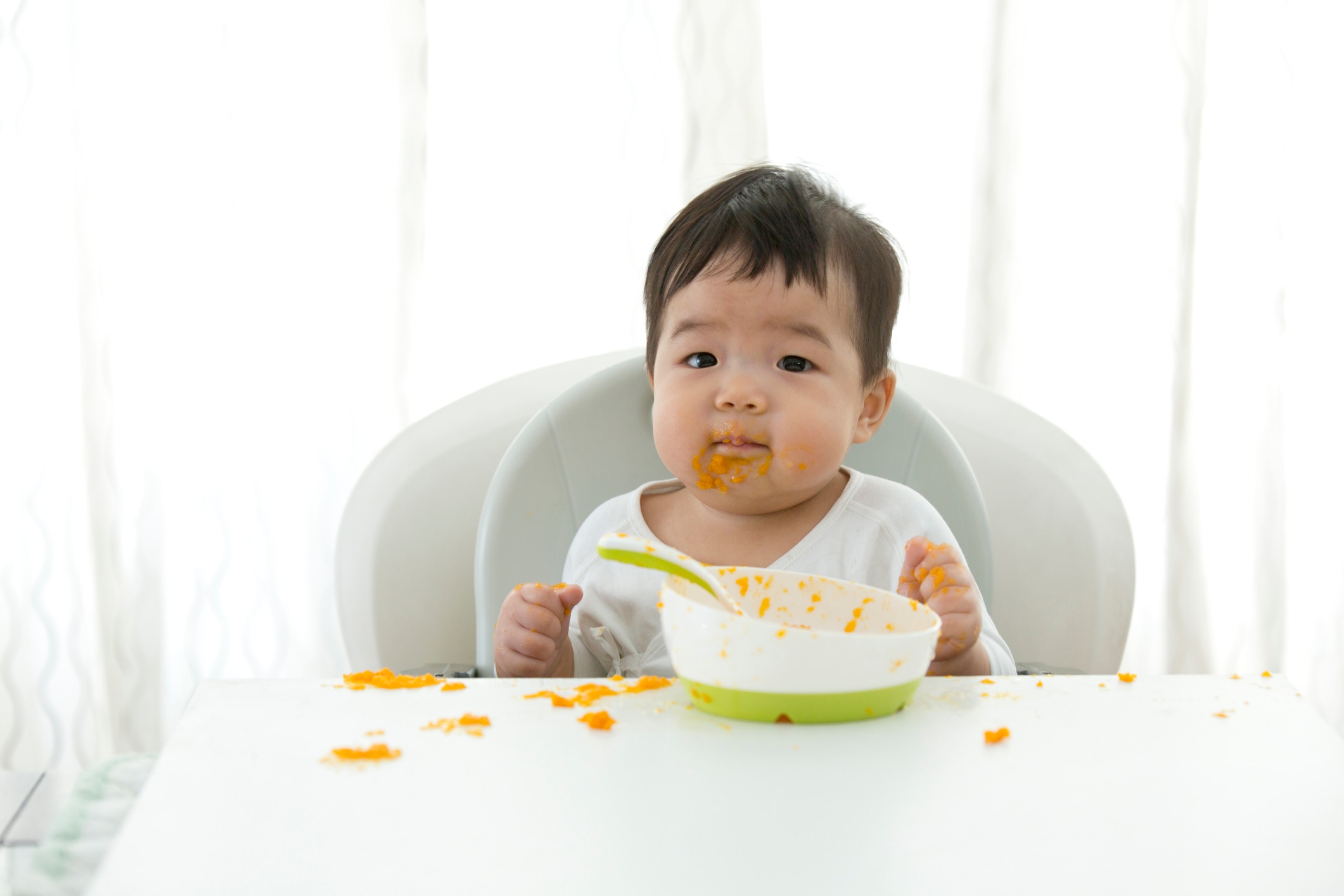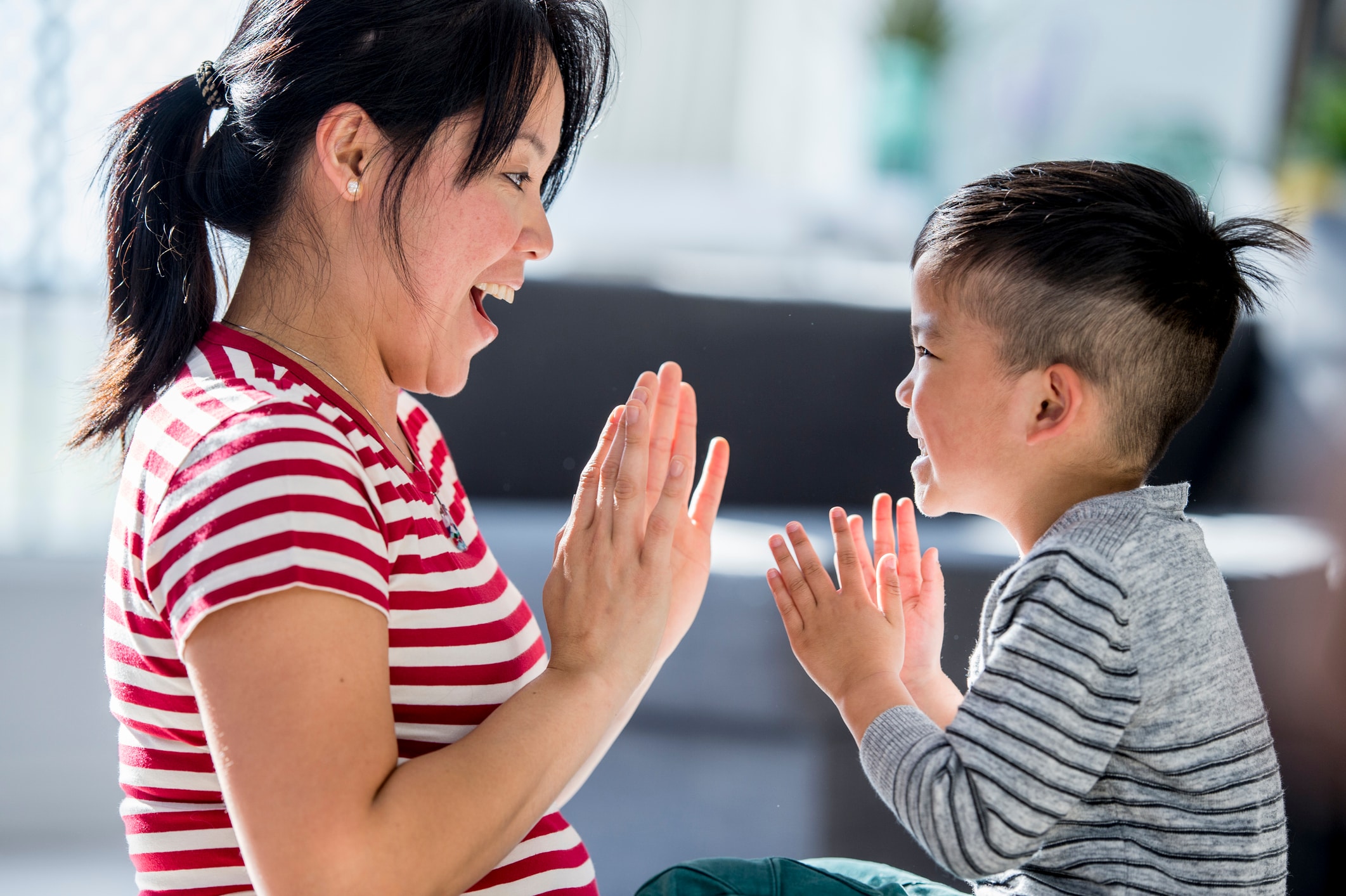Leaving your baby with their grandparents for the first time overnight tends to spur a slew of emotions. From worry that separation anxiety could rear its ugly head to excitement for a night of undisturbed sleep, all kinds of feelings can pop up for parents, depending on the situation. But despite the rollercoaster, there are big perks for tackling this milestone — for everyone involved.
“For caregivers, it may be hard to visualize the upsides at first,” says Dr. Jack Maypole, pediatrician at Boston Medical Center and member of The Goddard School’s educational advisory board. “But you can come back from a weekend or night away, for perhaps the first time in months, with your energy battery topped off.” As for babies? “I think it builds resilience over time,” Maypole says. “Much as all of us have our own style [and preferences], kids are incredibly resilient, and they can adapt to different ways of doing things very early on.”
So when is it okay to leave a baby with their grandparents overnight? Here, experts shed light on the developmental stages that affect how well your little one will adjust to spending the night with grandparents, and share tips for making your baby’s first sleepover a success.
What age can you leave a baby with grandparents?
When it comes to infant development, typically between 4 to 9 months is viewed as the “sweet spot” for having grandparents or another trusted adult care for your baby overnight for the first time, according to Maypole. But this varies greatly from family to family due to many factors, the biggest being you and your child’s individual needs.
“When we’re talking about guidance here, we are talking about neurotypical kids,” Maypole says. “Twenty percent of kids, however, have diverse needs. For kids on the spectrum, for example, they need less sleep. There may not be a normal standard for these families.”
Circumstances and life events will also impact what age is best to enlist grandparents’ help with overnight care. “Due to complications following birth, parent work schedule or other circumstances, an infant might stay overnight with a grandparent or another caregiver from the start,” says Becca Wallace, child and adolescent psychologist with the Children’s Hospital New Orleans. “If it works for the family, it works.”
So, what makes 4 to 9 months the optimal time to try an overnight with the grandparents in terms of your baby’s development? “Think about a child’s development as a combination of indicators: social, physical and cognitive,” explains Dr. Colleen Kraft, a pediatrician at Children’s Hospital Los Angeles and past president of the American Academy of Pediatrics (AAP). “Together these milestones inform developmentally appropriate ways to understand and engage with a young child, as well as predict where problems may occur.”
Below experts share insight into the developmental stages during the sleepover “sweet spot” that will most impact their readiness to spend their first night away from mom and dad:
4 to 6 months:
“Usually by 4 months, babies are in a feeding groove,” Maypole says. This means they are typically able to feed from a bottle without issue, which is why this tends to be the age it becomes easier to leave your little one with another caregiver overnight.
But keep in mind that feedings will still be required throughout the night during these early months, Kraft notes. “Most children wake one to two times per night for feeding [at this age] and may have developmentally appropriate sleep regression,” she says. “An overnight caregiver would need to recognize that they may be waking with the baby in their care.”
6 to 7 months:
“Most babies start to sleep through the night around 6 months, especially if they have a good sleep routine,” Wallace says. “They also have not typically developed separation anxiety yet, so they are more comfortable being apart from parents.” This is why planning your baby’s first sleepover with another caregiver by 6 months is ideal, according to all experts we spoke to.
This stage is also when infants start to have facial and social recognition of caregivers other than parents, Wallace explains. This allows them to feel more comfortable with caregivers they interact with often in addition to the ones who regularly put them to bed each night.
8 to 9 months:
“Around 8 months, infants develop something called object permanence,” explains Dr. Lena Claire van der List, a pediatrician with UC Davis Children’s Hospital in Sacramento, California. “This is a cognitive milestone where a child is aware that once an object disappears, it still exists. Not coincidentally, this is also the time that separation anxiety starts to develop, and bedtimes can become more of a struggle for parents.”
In other words, this is the stage when it can get tricky to try a sleepover for the first time. Around this age is also when babies become capable of pulling themselves up and standing up in their crib if they wake up crying, van der List says. “While these are all developmentally normal achievements, they can make overnights more challenging for caregivers,” she says.
Will my baby do better if they’re older for their first night away?
Simply put, no. “Babies typically first start to experience stranger anxiety around 6 months of age with a peak period during 12 to 18 months of age,” explains pediatric neuropsychologist Erica Kalkut who specializes in evaluating developmental stages in children from infancy through early adulthood as executive clinical director at LifeStance Health. “Around this same time, babies are forming closer attachment to their familiar caregivers and nervousness when their familiar caregivers separate,” she says.
Children will typically continue to have feelings of anxiety when separated from a familiar caregiver throughout the toddler and preschool years, according to Kalkut. But if you haven’t planned an overnight with another trusted caregiver by this time, don’t worry. Just be patient.
“As children build greater cognitive ability during preschool years, they begin to develop concepts that allow them to understand that people exist even when they don’t see them and that these people come back to them,” Kalkut says. “This greatly helps a child, usually during school age years, feel more comfortable having their primary caregivers leave them with other caregivers.”
How to know if it’s the right time to leave your baby with their grandparents for the first time
“First, understand your baby’s patterns,” Kraft says. “If they are eating and sleeping and have established routines, it is okay to allow them to spend a night away.” She also advises parents to recognize their own fears about leaving their baby overnight for the first time, which are usually normal and natural, and to wait until you feel comfortable.
If you’re feeling unsure that your baby — or their grandparents — are ready for an overnight adventure, experts suggest doing a “trial run” during the day. “This gives both the caregiver and the baby a chance to get comfortable with one another outside the presence of the parent,” says Dr. Jenny Nordby, a pediatrician with MUSC Children’s Health in Charleston, South Carolina. “It gives the caregiver the opportunity to ‘learn’ the baby’s personality and routines and the opportunity to troubleshoot any issues with the parent nearby.”
If you still feel unsure after a practice session, Nordby suggests waiting on making an overnight attempt and trying another practice round after some time has passed. “It’s nearly impossible to enjoy an overnight away from the child when a parent doesn’t feel confident that their baby is being well taken care of,” Nordby says. “As I like to tell parents, ‘Trust your gut.’”
How to prepare for your baby’s first sleepover with grandparents
“Anyone caring for an infant overnight should understand their developmental stage, especially in terms of sleep, to understand what to expect,” advises Wallace. With this in mind, be sure grandparents have a feel for your baby’s unique stage of development to ensure they are ready and willing to brave the night even if no one sleeps, which is critical, she says.
Once everyone is on the same page, here’s how experts recommend parents go about ensuring a safe and successful first sleepover with grandparents.
Share a detailed routine to follow — but know it may be modified
Maypole suggests explaining a typical day (and night) in the life of your infant in detail so grandparents have a routine to follow. This includes timing of feedings, naps, bathtime and bedtime, plus all your little one’s favorite activities that go on before and after these events.
“It’s really helpful to let them know they should try to stick to this routine as closely as possible because it will reduce stress [for your child],” he says. “But with the understanding that it will most likely be modified simply due to the circumstances.”
Practice baby’s sleep routine
If your baby’s first sleepover will be at a grandparents’ home, parents should consider having their baby “practice” sleeping in the portable crib or bassinet that they will use. “The parent should also provide the caregiver with the baby’s own crib sheet, noise machine or nightlight so the baby experiences some familiarity, despite the new environment,” Nordby says.
If grandparents will be staying at your home, consider having them observe you perform a typical nighttime or bedtime routine prior to the big night. This will give the caregiver the opportunity to ask questions and troubleshoot any bedtime issues, Nordby explains.
Put appropriate health and safety protocols in place
Parents should make sure caretakers always have a way to connect with them, Maypole says. “They should also have the name of your child’s pediatrician, insurance information and a note authorizing them to take your child to get care in case of an emergency,” he says.
Grandparents must also be capable of performing certain important tasks to ensure your baby’s health and safety, such as knowing how to prepare milk or formula and feed and bathe your little one, Nordby says. She suggests they practice all these things before being left alone overnight.
In order for grandparents to be well suited to babysit an infant, the experts we spoke to also recommend the following:
- They are trained in infant CPR.
- They know how to accurately dose and administer infant medications.
- They can safely diaper and dress a baby where the child cannot suffer a fall.
- They feel confident installing and using an infant car seat correctly — even if travel is not planned, in case unexpected medical care is required.
- They are immunized against pertussis (whooping cough) and influenza during flu season to avoid exposing the baby unnecessarily to infectious diseases.
- They are aware of AAP safe sleeping recommendations, such as sleeping on their back, placing an infant on a firm, flat surface with no loose blankets or crib bumpers, and not co-sleeping.
Lastly, if your baby is staying in a grandparent’s home, older caregivers must recognize that measures must be taken to ensure the environment is safe, especially if your little one can crawl or walk. “Grandparents often have medications at home that are toxic to babies in very small doses and may not be as vigilant as parents in ‘childproofing’ their home,” Nordby says. Even if it alters their own routines, grandparents must be willing to ensure medications are out of a child’s reach and in child-proof containers if they want to host a sleepover, she says.
Alternatives to leaving your baby with grandparents
If grandparents aren’t available to babysit, know that there are other suitable overnight child care options for those early days. “I think for many people, family is the most vetted and most well known option,” Maypole says. “So if you can access them through proximity, that’s great.”
If not, however, he suggests enlisting the help of close friends, members of your community or finding a trained professional through a reputable caregiving service. “There are people who are well vetted and well paid who can care for newborns,” Maypole says. “In this instance, you’re a little less cognizant of who the candidate is, so there is probably an advantage of going with a service because those services have the more vetted professionals.”
The bottom line
Developmentally, the best age to leave your baby with their grandparents for the first time overnight is between 4 to 9 months old, according to pediatricians and pediatric development professionals. And contrary to what caregivers may think, waiting too much later to attempt a first sleepover could make things harder since separation anxiety develops between 7 to 9 months.
If you must leave your little one with another caregiver overnight sooner or before you — or your baby — feel completely ready, that’s okay too. “Sometimes you have no choice,” Kraft says. “In these instances, a familiar adult will provide comfort for your child in your absence. Understand that even a night away with your spouse can support the caring partnership you need to raise a young child. This is all beneficial for your child’s development.”
Before caring for your baby overnight, experts advise that grandparents should feel comfortable with your infants’ nightly routine and be capable of caring for their health and safety. “Once you are comfortable with your caregiver, your child’s routines and your own fears, you can plan overnights that are necessary for your own health and fun for your baby,” Kraft says.
